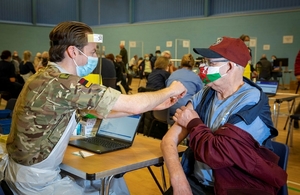Policing to receive up to £1.1 billion extra to cut crime
Policing will receive a funding boost of up to £1.1 billion next year to drive down crime and deliver safer streets for all, Home Secretary Priti Patel announced today (Thursday 16 December).
The 2022/23 funding package represents an inflation-busting 7% cash increase on last year and means policing will receive up to £16.9 billion in total in 2022/23.
The boost in resources will help support the delivery of the Beating Crime Plan, which set out the government’s mission to deliver fewer victims, safer neighbourhoods, and a more secure country. In particular, the plan focuses on driving down homicide, serious violence and neighbourhood crime – to ensure that everyone can benefit from the security that a safe home, street and country provides.
The additional funding will allow police forces to continue the work already being done to target criminals, which has seen:
- a 14% fall in overall crime (excluding fraud and computer misuse) between June 2019 and June 2021
- 11,053 additional officers hired across England and Wales – 55% of the target of 20,000 extra police officers by March 2023
- over 1,500 county lines closed, over 7,400 arrests, £4.3m in drugs seized and more than 4,000 vulnerable people safeguarded, thanks to our investment in shutting down county lines since 2019.
- almost 16,000 knives and other dangerous weapons removed from the streets last year thanks to police use of stop and search powers.
- 300,000 at risk young people reached through Violence Reduction Units, set up across the country thanks to £105.5m in funding. This forms part of the £242m we’ve invested since 2019 to zone in on serious violence and homicide hotspots.
Within the total package, forces will also be given £550 million more from government grants, including funding for hiring the 20,000 extra officers promised by the government by the end of March 2023. The successful recruitment campaign has already seen more than 11,000 additional police officers join up and make a difference in communities across England and Wales.
Home Secretary, Priti Patel, said:
Crimes including theft, burglary and knife crime are down, we’ve got an additional 11,053 police officers on our streets, and we’ve shut down 1,500 drugs lines which exploit the young and the vulnerable.
But we must go further and faster to make our communities even safer, so today I am giving our excellent police forces and law enforcement agencies more funding to do just that, in line with our Beating Crime Plan.
Reducing crime is a top priority for this government and I will continue working with police leaders to ensure this unprecedented investment results in less crime and fewer victims.
Minister for Crime and Policing, Kit Malthouse, said:
We have asked a lot of our police over the course of the pandemic, and while it’s true that our neighbourhoods are getting safer, we are removing weapons and drugs from our streets and we are putting thousands more police on the beat, now is not the time to take our foot off the pedal.
Beating crime is the government’s number one priority, and I am confident this settlement will give the police the resources they need to keep our families and our communities safe.
Funding to Police and Crime Commissioners (PCCs) is increasing by up to an additional £796 million, assuming full take-up of precept flexibility. PCCs will have up to £10 of precept flexibility per Band D property in each of the next three years to use according to their local needs.
The settlement includes more money to enable the police to tackle Serious Organised Crime, support rape victims and protect our national security, with Counter Terrorism police funding increasing to over £1 billion for the first time.
From the total settlement, £1.4 billion will be spent to deliver on national priorities, including taking down more county lines, reducing violent crime, child sexual abuse and exploitation, fraud and modern slavery.
Next year will see:
- more officers to specifically tackle serious organised crime
- the creation of a National Crime Laboratory to drive the use of innovative data science techniques to prevent and reduce crime
- increase testing of innovative ways for the police and CPS to investigate rape cases
- delivering on our commitment to ensure that no victim of rape and serious sexual assault is left without a mobile phone for more than 24 hours
- improvements in local police performance, including measuring responsiveness to 101 and 999 calls
- further investment in law enforcement intelligence and investigations to tackle economic crime
- more investment in tackling fraud and improving the way in which intelligence on firearms is collected and managed
- investment in major law enforcement programmes, and other critical national police and law enforcement IT capabilities
The funding boost is further evidence of the government’s determination to bear down on crime and follows a series of recent developments including:
- the publication of a 10-year drugs strategy, which includes a commitment to dismantle over 2,000 county lines. The strategy is also backed by the largest ever increase in investment in treatment and recovery services
- plans for a new Victims’ Law to provide better support for victims and ensure their voices are heard during the criminal justice process
- a new plan to deliver the biggest prison-building programme in more than 100 years – creating the right conditions to reform and rehabilitate offenders and ultimately cut crime
National Police Chiefs’ Council Lead for Finance, Chief Constable Gavin Stephens, said:
We welcome the certainty provided to policing by the recent multi-year settlement, and investment in additional officers.
The confirmation of funding announced today will allow forces to focus additional resources into tackling priority crime areas for the public, such as targeting those that perpetrate violence against women and girls, county lines drug gangs and serious violent crime.
Chief Constable Andy Marsh, College of Policing CEO, said:
More funding to support policing is welcome as the service continues to work relentlessly to prevent crime and protect the public.
The additional police officers coming into the service will strengthen the existing workforce and allow forces to make decisions on how best to use this resource to keep the public safe.
The demands and complexity of policing are changing and it is important that forces have the resource to continue tackling traditional crime types such as burglary, while also listening to the public and renewing our focus to better protect women and girls, improve diversity and build trust.
The publication of the provisional funding settlement opens a period of consultation. The final police funding settlement will be debated in Parliament ahead of the new financial year.
| Police Force Area | 2021/22 | 2022/23 | Maximum cash increase |
|---|---|---|---|
| Avon & Somerset | 343.6 | 362.3 | 18.8 |
| Bedfordshire | 129.2 | 136.1 | 6.9 |
| Cambridgeshire | 165.0 | 173.7 | 8.7 |
| Cheshire | 220.1 | 232.2 | 12.1 |
| City of London | 71.2 | 74.5 | 3.3 |
| Cleveland | 149.2 | 157.0 | 7.7 |
| Cumbria | 122.3 | 128.9 | 6.6 |
| Derbyshire | 204.8 | 215.6 | 10.9 |
| Devon & Cornwall | 355.8 | 375.2 | 19.4 |
| Dorset | 151.1 | 158.4 | 7.3 |
| Durham | 140.6 | 148.3 | 7.7 |
| Dyfed-Powys | 121.9 | 127.9 | 6.0 |
| Essex | 335.5 | 355.0 | 19.5 |
| Gloucestershire | 133.3 | 139.7 | 6.4 |
| Greater Manchester | 673.1 | 711.9 | 38.8 |
| Gwent | 150.0 | 157.8 | 7.7 |
| Hampshire | 387.6 | 409.4 | 21.8 |
| Hertfordshire | 233.8 | 247.4 | 13.6 |
| Humberside | 211.1 | 222.7 | 11.5 |
| Kent | 357.0 | 377.2 | 20.2 |
| Lancashire | 325.7 | 343.2 | 17.4 |
| Leicestershire | 215.0 | 226.2 | 11.1 |
| Lincolnshire | 138.8 | 145.8 | 7.0 |
| Merseyside | 378.3 | 399.7 | 21.4 |
| Metropolitan Police | 3,072.3 | 3,236.5 | 164.2 |
| Norfolk | 186.6 | 196.2 | 9.7 |
| North Wales | 176.1 | 184.5 | 8.4 |
| North Yorkshire | 171.7 | 180.3 | 8.6 |
| Northamptonshire | 153.3 | 160.9 | 7.6 |
| Northumbria | 322.1 | 342.6 | 20.4 |
| Nottinghamshire | 237.2 | 250.2 | 13.0 |
| South Wales | 333.5 | 350.6 | 17.1 |
| South Yorkshire | 297.1 | 314.3 | 17.2 |
| Staffordshire | 221.1 | 232.9 | 11.8 |
| Suffolk | 141.9 | 149.8 | 7.8 |
| Surrey | 261.1 | 274.4 | 13.3 |
| Sussex | 327.7 | 346.2 | 18.5 |
| Thames Valley | 483.3 | 510.1 | 26.8 |
| Warwickshire | 116.0 | 122.2 | 6.2 |
| West Mercia | 249.3 | 262.6 | 13.2 |
| West Midlands | 655.5 | 694.9 | 39.4 |
| West Yorkshire | 510.8 | 540.4 | 29.6 |
| Wiltshire | 135.1 | 142.1 | 7.1 |
| Special branch transfer | -43.9 | ||
| Total England & Wales | 13,721.7 | 14,517.5 | 795.8 |


